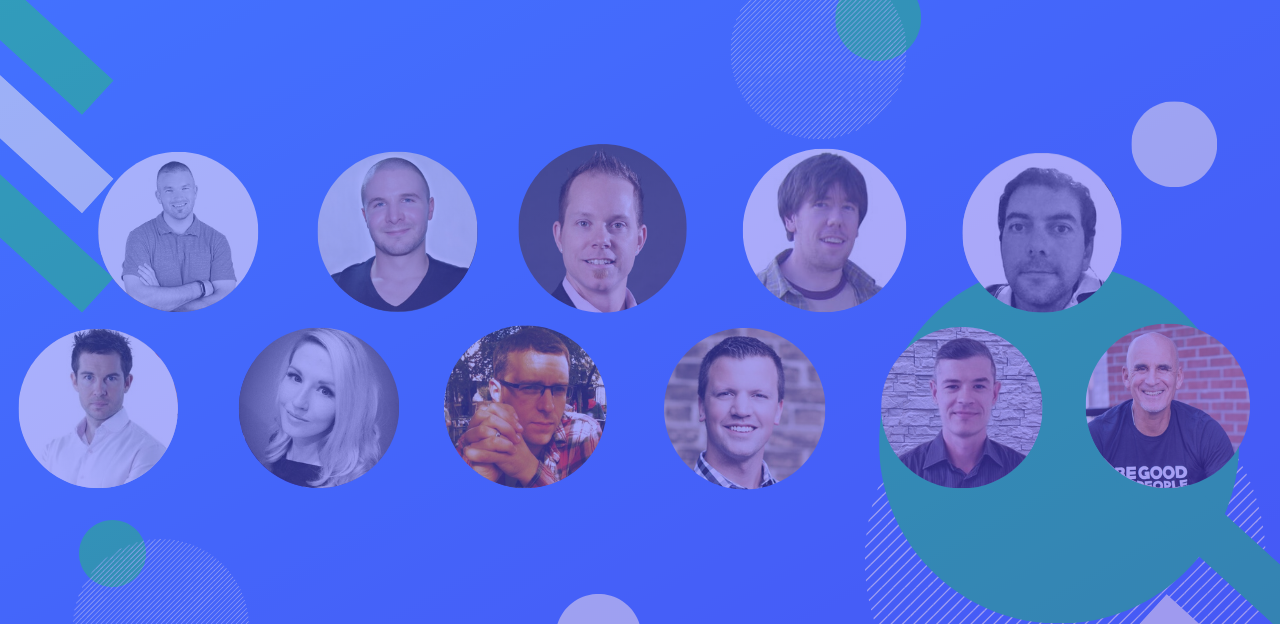Nowadays, conventional wisdom asserts that SEO is always on the go, especially as search engines are constantly changing their algorithms. And yet there are still many SEO tips and tricks that appeal to us just because they had amazing results for someone else.
To put it in a straightforward way, there is no magic formula for boosting SEO. Instead, this optimization journey is a long-term, personalized, and continuous effort that should target both the technical and the content pillar of SEO.
In order to help you direct your optimization efforts in the right direction, we asked 11 SEO thought leaders to provide their insights on The Most Common SEO Myths and Mistakes. Keep reading and learn what to keep an eye on when building and fine-tuning your eCommerce website.
Ross Hudgens
Founder and CEO at Siege Media

“As we work on the link-building side, we find many new hires take months to train up so, in a way, they make many mistakes. A common one is not enough personalization in emails or proper prospecting of a link target (such as their reaching out to people who have never covered third-party sites). That’s why we created a content marketing course for our own team to train up on and learn.
We see this very often in emails to our site as well, as they often lack personalization and we have never covered third-party content in a consistent way, so there’s no reason for us to be pitched at all! So much time can be wasted if things are done incorrectly in this way.”
Sam Hurley
Managing Director at Optim-Eyez

“Pet Hate Mistake: After self-researching SEO and identifying some cheap agencies or freelancers, it becomes apparent you can get away with spending just a couple-or-so hundred dollars for a “quality” link building and blog creation package. A fantastic opportunity in 2019+! (Not.)
SEO has become a complex art compared to what it was two decades ago — if you don’t understand this art, it pays to hire real experts who hold tried and tested knowledge of today’s ever-changing trends. You absolutely must invest adequate time AND money in order to see longstanding success.
I always compare it to accountancy. It’s a specialty in itself that requires granular expertise.
Common SEO Myth: SEO is dead. It doesn’t work!
Hmmm. An industry approaching a total worth of $20 billion in the year 2020 doesn’t seem to be dying anytime soon.”
Shane Barker
CEO and Digital Strategist at Shane Barker Consulting

“One of the biggest SEO mistakes that people make is that of creating content just for the sake of it. Many websites end up falling into this trap of coming up with new content so that the website has something new to post. However, it’s essential to understand that you must do thorough keyword research and invest time into creating evergreen long-form content that can provide real value to your readers. The goal should be to become a great source of information and not a place where you can find tons of frivolous content. Writing longer in-depth content that can be referred to at any point is the key to success.”
Aaron Wall
Founder of SEOBook

“I think the biggest SEO myth is having an absolutist view about anything. “Never do X. Y always works.”
Almost everything is true and almost everything is false, depending on your experience set. If a person has a small enough sample size it is very easy to draw wrong conclusions based on loose correlations without understanding the “why” behind it.
One of the most absurd examples I can think of was when one person hired a really low-paid writer to make a few blog posts that they were planning on later improving and building into a full site. Well, they never really got around to replacing those blog posts and turning it into a full site, however, one of the writers basically syndicated a slight rewrite of a press release from a quack doctor who was publicly embarrassed and shamed offline. After the quack doctor went offline & deleted his press release other doctors who hated him were linking at that thin blog & it actually accumulated enough link equity that it was ranking in the top 20 for a single word big-money search query with no other link building or marketing.
Drawing the wrong lesson from the above example would be saying one should promote quack doctors offering novel & scammy medical procedures. Drawing the right lesson from the above would be saying one should be remarkable (as in Seth Godin’s definition of remarkable from his Purple Cow book), though ultimately that site was remarkable for all the wrong reasons. That same site could have & should have leaned into the success they lucked into by rewriting the page to make it far more detailed & amplify the outrage to draw even more inbound links.”
Dan Lawrence
Head of Client Services at Marketing Labs

“In addition to the “SEO is Dead” myth, I think the single biggest mistake most owners or managers of digital propositions can make is to “silo” SEO, as in thinking of SEO as a single marketing channel or promotional tool that stands by itself and not appreciating the all-encompassing and holistic nature of SEO.
This leads to the single biggest and most fundamental mistake many businesses make in regards to their digital assets and proposition, and that is calling in the “SEO Guy” after they have already finished their websites. All websites need to be built from the ground up, with SEO in mind throughout the entire process, but especially and most importantly at the very beginning of the process.
It’s a bit like building a department store by yourself and only after it’s finished calling in the architect, engineers, and surveyors to see if it will remain standing. That’s too late. It will fall over, because those experts needed to be hired first, not last, and even mid-way through the project is obviously too late without going back over everything already done with a full audit and then a lot of repair work (which will entail what could have been avoided if the SEOs were hired in first and foremost). Call them in first and use them foremost to correctly set the foundations of everything you do digitally and then to oversee and guide everything that follows on from those solid foundations.”
James Reynolds
Founder of SEO Sherpa

“Linking Out to Other Websites Damages Your Ranking
There is a generally conceived notion in the world of SEO that outbound links dilute your site’s authority. This is based on the premise that a web page can both give and receive Page Rank.
The more inbound links you receive, the higher your Page Rank, the greater the number of outbound links you give out the more Page Rank you give away. In short, inbound links are good, outbound links are bad.
But, that’s not actually the case.
In an experiment conducted by Reboot Online featured here, Shai Aharony and his team discovered that websites that link out to credible resources outrank those that don’t.
And, that would make sense, right?
Linking out helps users and search engines in several ways:
- Gives search engines more context about the meaning of your web page through its association with other web pages.
- Increases trust signals through proper attribution of the sources you mention in your content.
- Improves discoverability and therefore contributes to a better user experience and better indexing for search engines.
Next time you create a piece of content, look for opportunities to link out to credible websites in your niche. Not only is that good karma, but it’s also good for your rankings.”
Kim Ekin
Technical SEO Specialist at Kaiser Solicitors

“One of the myths that still remains today, that I tend to see quite a lot in clients’ websites, is optimized meta descriptions. Optimizing a meta description is not a ranking factor for Google. Although a meta description can sometimes influence click-through rates, it has no ability to influence Google’s algorithm. This is a myth that has been around for quite a while and I find myself having to debunk every few months!”
Marcus Miller
Founder of Bowler Hat

“At Bowler Hat (my agency), we work with a lot of small businesses. A common myth or misunderstanding we come across is that there is some kind of secret sauce or special tactic that we, masters of the dark arts of SEO, can put in place to boost them to the top of the rankings. They don’t need to worry about all the hard work building a user-friendly site, crafting truly helpful content, or even just getting the really fundamental SEO basics in place – we just have to wave our magic SEO wand and reveal the secret to #1 rankings.
This kind of thinking is unhelpful. It is not good for us as an agency. It is not a good use of time for the customer to obsess on the ins and outs of the search algorithm. Ultimately, strong rankings are built on a philosophy of being the best. Conduct an SEO SWOT analysis for you and your competitors. Find what they do well and not so well. Take a good, honest look at your site and ensure you do everything you can to ensure you have the fastest site with the best user experience, and of course, the most useful content to help your potential customers. A basic SEO audit can be useful here (we have a free one) to get the nuts and bolts in place as well, as this is also important.
The key takeaway here is an appreciation that getting strong SEO results takes good, old-fashioned hard work. But the work you do should align closely with the expectations and needs of your audience. So, by working with a “be the best” SEO philosophy you will also be improving your conversion rates and results from all other marketing tactics.
There is no SEO secret or silver bullet – good SEO is part art, part science, and a lot of work – but if you put the effort in, the results can be stellar!”
Nate Dame
Founder and CEO at Propecta

“Here’s what I struggle with the most:
The myth that technical SEO work always leads to traffic growth.
I come across a lot of companies that have spent months or even years trying to perfect various technical aspects of their website to improve SEO, but in spite of it all, they are still looking at flat traffic trends – or even declines!
What some marketers don’t realize is that SEO is competitive above all else. The best content wins, and good technical SEO is only the foundation. What you need is a strong content engine built to create not just good or “optimized” or “great” content, but content that is better than your direct competitors.”
Robert Clarke
Chief Marketing Officer at Sensei Marketing

“I think that when it comes to SEO, a lot of people still think about tactics like keyword targeting, meta descriptions, links, etc. – which are all still important. However, these tactics focus on your website. But what you should be focusing on is your visitor. More and more search engines reward websites that have high engagement metrics such as time-on-site, pages-per-visit, low bounce rates, and a great mobile experience.
Here are three tips to help improve your website’s engagement:
- Video is the number one type of content consumed on websites. Look to add explainer videos, podcasts, or insert videos into blog posts to increase time on site.
- Create a faster user experience by using Google AMP markup for key pages on mobile, and compress large images with free tools like Compressor.io for faster load times.
- You get traffic to your blogs, but users don’t stay on your site. Make sure every blog has a specific “next action,” whether it’s to learn about a specific product/service related to your blog, read another blog relevant to the same topic, download an eBook, or even just to sign up to receive future blog posts to help bring back the visitor in the future.”
Ted Rubin
Chief Marketing Officer at Photofy

“The #1 biggest mistake I see is that most brands have not noticed, OR are not willing to accept, that we’re moving to a “connection economy,” and that producing ongoing content at scale that meets the new search “relevancy” standards is incredibly necessary. They need to study their audiences, customers, and prospective customers, listen to their social conversations, and develop plans to use that content in their social profiles to emotionally connect to their audiences and encourage conversation. When it resonates, it gets shared and receives comments and likes, which makes that brand more visible both in people’s feeds and especially in their searches.
The second, and another critical mistake/oversight, is not empowering their employees to create content on a regular basis. Brands that will win this new journey are providing large quantities of fresh and relevant content for shoppers to use when they actually need it. Not only does this help simplify shopping, but it also has a lasting impact on the algorithms that affect what shoppers find across all forms of search.
Especially effective is localized content, as search becomes much more geo-specific. In the face of declining returns from digital advertising and the growing need for more of this kind of superior, impactful content, collaborative content creation (crowd marketing) offers a highly effective solution.
Did you know that employee-generated content receives eight times more engagement than content shared by the company itself? On top of that, employee content extends brand messaging by over 500%. Crazy, right? So why aren’t more companies getting employees engaged in content creation?
Employee Created Content (#ECC) is so valuable and overlooked by almost every brand. First, ECC leverages the personal influence of the content creators, thereby delivering substantially higher engagement rates than corporate branded content. For larger organizations, such as franchises and retailers, ECC helps to localize and personalize content in a way that isn’t possible with geo-targeted advertising alone. Finally, since ECC using common brand assets is all customized and shared by the different users, its impact on search-based algorithms is profound. Deployed at scale, crowd marketing can significantly augment corporate digital media efforts and it allows the organization to empower its employee base in this effort as well.
It’s well known that companies with engaged employees outperform their peers; involving employees in content creation can help to create a sense of common purpose, scale content marketing, AND profoundly affect search results.”
To wrap it up, here the key takeaways of this roundup:
- There are very few precise Do’s and Don’ts in SEO.
- Technical SEO does not guarantee traffic growth.
- Content is vital, but not any type of content – customer-oriented, user-generated and evergreen should be its cornerstones.
- Outbound links are just as important as inbound links.
- Meta descriptions are not ranking factors.
The success of any eCommerce business is driven by its website traffic. In the fierce competitive environment that eCommerce fosters, any detail matters in making a difference. SEO is one of those readily available (and, mostly free) tools to leverage in order to boost your online business. Nevertheless, make sure you stay open to the dynamism of this ever-evolving field in order to succeed in your optimization game.
Have you come across any misconceptions or dismantled any myths during your SEO journey? Feel free to share them with us and with the other fellow readers in the comments below!




